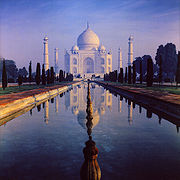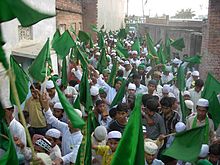- Mawlid
-
A series of articles on

Prophet of Islam
Muhammad
Life
In Mecca · Hijra · In Medina · Conquest of Mecca · Wives · Farewell pilgrimage · Family tree ·
Career
Qur'an · Hadith ·
Early reforms under Islam · Diplomacy · Military · Persecution by Meccans · Migration to Abyssinia ·
Miracles
Isra and Mi'raj · Relics · Splitting of the moon ·
Al-Masjid al-Nabawi ·
Views by subject
Jewish · Christian · Slavery ·
Succession
Farewell sermon · Saqifah · Pen and paper · Family · Companions · History ·
Praise
Durood · Na'at · Mawlid · Haḍra · Madih nabawi ·
Ya Muhammad ·
Perspectives
Islamic · Jewish · Bible · Medieval Christian · Historicity · Criticism · Prophetic biography · Depictions · Films · Depictions in film ·
Part of a series on
Islamic culture
Architecture Arabic · Azeri
Indo-Islamic · Iwan
Moorish · Moroccan · Mughal
Ottoman · Persian · Somali
Sudano-Sahelian · TatarArt Calligraphy · Miniature · Rugs
Dress Abaya · Agal · Boubou
Burqa · Chador · Jellabiya
Niqab · Salwar kameez · Taqiya
kufiya · Thawb · Jilbāb · HijabHolidays Ashura · Arba'een · al-Ghadeer
Chaand Raat · al-Fitr · al-Adha
Imamat Day · al-Kadhim
New Year · Isra and Mi'raj
al-Qadr · Mawlid · Ramadan
Mugam · Mid-Sha'ban
al-TaiyyabLiterature Arabic · Azeri · Bengali
Indonesian · Javanese · Kashmiri
Kurdish · Persian · Punjabi · Sindhi
Somali · South Asian · Turkish · UrduMawlid (Qur'anic Arabic: مَوْلِدُ النَبِيِّ mawlidu n-nabiyyi, “Birth of the Prophet” Standard Arabic: مولد النبي mawlid an-nabī, sometimes simply called in colloquial Arabic مولد , mawlid, mevlid, mevlit, mulud among other vernacular pronunciations) or sometimes ميلاد , mīlād is a term used to refer to the observance of the birthday of the Islamic prophet Muhammad which occurs in Rabi' al-awwal, the third month in the Islamic calendar.[1]
The term Mawlid is also used in some parts of the world, such as Egypt, as a generic term for the birthday celebrations of other historical religious figures such as Sufi saints.[2]
Contents
Etymology
Mawlid is derived from the Arabic root word (Arabic: ولد), meaning to give birth, bear a child, descendant.[3] In contemporary usage, Mawlid refers to the observance of the birthday of Muhammad.[1] Other terms used for this event include:
- Mawlid an-Nabī (pl. al-Mawālid) – The Birth of the Prophet (Arabic)
- Milād an-Nabī – The Birth of the Prophet (Arabic/Urdu)
- Mevlid-i Şerif – The Blessed Birth / Mevlüt – The Name (Turkish)
- Mevlud/Mevlid – Birth (Bosnian)
- Mawlūd-e Sharīf – The Blessed Birth (Dari/Urdu)
- Zadruz-e Payambar-e Akram – The birth of the great/blessed Prophet (Persian)
- Eid al-Mawlid an-Nabawī – Festival of the birth of the Prophet (Arabic)
- Eid-e-Milād-un-Nabī – Festival of the birth of the Prophet (Urdu)
- Mawlid en-Nabaoui Echarif – The Blessed Birth of the Prophet (Algerian)
- el Mūled (en-Nabawi)/Mūled en-Nabi – The birth (of the prophet)/Birth of the prophet (Egyptian Arabic)
- Yawm an-Nabī – The Day of the Prophet (Arabic)
- Maulidur-Rasūl – The Birth of the Messenger of Allah (Malay)
- Mulud – The Birth (Javanese)
- Maulid Nabi – The Birth of the Prophet (Indonesian)
- Maulud Nabi – The Birth of the Prophet (Malaysian)
- Maulidi – ? (Swahili)
- Meeladu Nabi – The Birth of the Prophet (Sri Lanka, Maldives, South India)
- Gamou – ? (Wolof)
- Nabi/Mahanabi Jayanti – The birth of the (great) Prophet. (Sanskrit), (Indian Languages) 'Maha' means great.
Timing
Mawlid falls in the month of Rabi' al-awwal in the Islamic calendar. Shias observe the event on the 17th of the month, coinciding with the birth date of their sixth Imam, Ja'far al-Sadiq,and Prophet Muhammad while Sunnis observe it on the 12th of the month. As the Islamic calendar is a lunar calendar, the corresponding date in the Gregorian calendar varies each year. The following table gives a list of dates showing the date Mawlid will be observed. In 2007, Mawlid fell on 31 March for the Sunnis or 5 April for the Shi’as.
Approximate dates for Mawlid, 2008–2013[4] Gregorian Year 12th of Rabi'-ul-Awwal
(Sunni and some Shia)17th of Rabi'-ul-Awwal
(Shi'a)2008* 20 March March 25 2009* 9 March March 14 2010* 26 February March 3 2011* 15 February February 20 2012 4 February February 9 2013 24 January January 29 * Confirmed date. All other dates are estimates, since the actual date may vary according to the sighting of the moon for the start of the month. History
The basic earliest accounts for the observance of Mawlid can be found in 8th century Mecca, when the house in which Prophet Muhammad was born was transformed into a place of prayer by Al-Khayzuran (mother of Harun al-Rashid, the fifth and most famous Abbasid caliph).[5] Public celebrations of the birth of Muhammad did not occur until four centuries after his death. It was originally a festival of the Shia ruling class, not attended by the common people, with the first official Mawlid celebrations occurring in Egypt towards the end of the 11th century.[5][6] The early celebrations included elements of Sufic influence, with animal sacrifices and torchlight processions along with public sermons and a feast.[7][8] The celebrations occurred during the day, in contrast to modern day observances, with the ruler playing a key role in the ceremonies.[9] Emphasis was given to the Ahl al-Bayt with presentation of sermons and recitations of the Qur'an. The event also featured the award of gifts to officials in order to bolster support for the ruling caliph.[9]
Abu al-Abbas al-Azafi (1162–1236) established the custom of celebrating Mawlid in Morocco. His son Abu'l-Qasim propagated it throughout the Maghreb.[10]
The first public celebrations by Sunnis took place in twelfth-century Syria, under the rule of Nur ad-Din Zangi Though there is no firm evidence to indicate the reason for the adoption of the Shi'ite festival by the Sunnis, some theorize the celebrations took hold to counter Christian influence in places such as Spain and Morocco.[11] Theologians denounced the celebration of Mawlid as unorthodox,[12] and the practice was briefly halted by the Ayoubides when they came to power, becoming an event confined to family circles.[13] It regained status as an official event again in 1207 when it was re-introduced by Muzaffar ad-din, the brother-in-law of Saladin, in Arbil, a town near Mosul, Iraq.[7][8]
The practice spread throughout the Muslim world, assimilating local customs, to places such as Cairo, where folklore and Sufic practices greatly influenced the celebrations. By 1588 it had spread to the court of Murad III, Sultan of the Ottoman Empire.[5][14] In 1910, it was given official status as a national festival throughout the Ottoman empire. Today it is an official holiday in many parts of the world.[5]
Legality
Islamic scholars are divided on whether observing Mawlid is necessary or even permissible in Islam. Some see it as a praiseworthy event and positive development,[15][16] while others say it is an improper innovation and forbid its celebration.
A number of Islamic scholars, such as Muhammad Alawi al-Maliki, Tahir-ul-Qadri the founder of Minhaj-ul-Quran, Akhtar Raza Khan Grand Mufti of India, Gibril Haddad, Shaykh Said Afandi al-Chirkawi, and Zaid Shakir, subscribing to Sufi Islam, and Yusuf al-Qaradawi, the primary scholar of the Muslim Brotherhood movement, have given their approval for the observance of Mawlid.[17] They suggest that fasting on Mondays is also a way of commemorating Muhammad's birthday. However, there is division among them on the lawfulness of the methods of the celebrations. Most accept that it is praiseworthy as long as it is not against sharia (i.e. inappropriate mingling of the sexes, consuming forbidden food or drink such as alcohol, playing music etc.).
Notable scholars who consider Mawlid to be bid‘ah and forbid its celebration include, Muhammad Taqi Usmani, a Deobandi scholar from Pakistan, and Abd al-Aziz ibn Abd Allah ibn Baaz, who was the Grand Mufti of Saudi Arabia subscribing to the Salafi movement.[18] Although all agree that the birth of Muhammad was the most significant event in Islamic history, they point out that the companions of Muhammad and the second and third generation of Muslims did not observe this event.
Observances
Where Mawlid is celebrated in a carnival manner, large street processions are held and homes or mosques are decorated. Charity and food is distributed, and stories about the life of Muhammad are narrated with recitation of poetry by children.[19][20][21] Scholars and poets celebrate by reciting Qaṣīda al-Burda Sharif, the famous poem by 13th century Arabic Sufi Busiri.
Mawlid is celebrated in most Muslim countries, and in other countries where Muslims have a presence, such as India, Britain, Russia[22] and Canada.[23][24][25][26][27][28][29][30][31] Saudi Arabia is the only Muslim country where Mawlid is not an official public holiday.[32] Participation in the ritual celebration of popular Islamic holidays is seen as an expression of the Islamic revival.[33]
During Pakistan's Mawlid celebration, the national flag is hoisted on all public buildings, and a 31-gun salute in Islamabad and a 21-gun salute at the provincial headquarters are fired at dawn. The cinemas shows religious rather than secular films on 11th and 12th Rabi-ul-Awwal.[34]
Among non-Muslim countries, India is noted for its Mawlid festivities.[35][36][37] The relics of Muhammad are displayed after the morning prayers in the Indian states of Jammu and Kashmir at the Hazratbal Shrine, on the outskirts of Srinagar. Shab-khawani night-long prayers held at the Hazratbal Shrine are attended by thousands.[38]
Other non-Muslim countries noted for its Mawlid festivities are Kenya and Tanzania where it is known as "Maulidi". In Kenya, the most famous place is the coastal island of Lamu[39][40][41] and Malindi. In Tanzania the largest celebrations are on the island of Zanzibar.[42][43]
In many parts of Indonesia, the celebration of the Mawlid al-nabi "seems to surpass in importance, liveliness, and splendour," the two official Islamic holidays of Eid ul-Fitr and Eid al-Adha.[44]
Other uses of the term
In some countries, such as Egypt and Sudan, Mawlid is used as a generic term for the celebration of birthdays of local Sufi saints and not only restricted to the observance of the birth of Muhammad.[45] Around 3,000 Mawlid celebrations are held each year and attended by tens of thousands of people. These festivals attract an international audience, with the largest one in Egypt attracting up to three million people honouring Ahmad al-Badawi, a local 13th century Sufi saint.[2]
See also
Notes
- ^ a b Mawlid. Reference.com
- ^ a b In pictures: Egypt's biggest moulid. BBC News.
- ^ Arabic: قاموس المنجد – Moungued Dictionary (paper), or online: Webster's Arabic English Dictionary
- ^ Islamic Holy Days. Moonsighting.com
- ^ a b c d "Mawlid (a.), or Mawlud", Encyclopedia of Islam
- ^ Kaptein (1993), p.29
- ^ a b "Mawlid", Encyclopedia Britannica
- ^ a b Schussman (1998), p.216
- ^ a b Kaptein (1993), p.30
- ^ Marion Holmes Katz, The birth of the prophet Muḥammad: devotional piety in Sunni Islam, Routledge, 2007, p. 10 and throughout
- ^ "Festivals and Commemorative Days", Encyclopedia of the Qur'an
- ^ Hava Lazarus-Yafeh. "Muslim Festivals". Numen 25.1 (1978), p. 53
- ^ Celebrating the Prophet's Birthday. Fatwa by former head of Al-Azhar Fatwa Committee.
- ^ Schussman (1998), p.217
- ^ Schussman (1998), p.??
- ^ The Blessed Mawlid. Zaid Shakir.
- ^ Shaykh Qardawi Approves of Celebrating Mawlid. Yusuf Al-Qardawi.
- ^ Reasons for the forbiddance of Celebrating the Birthday of the Prophet, by Saalih al-Fawzaan[dead link]
- ^ "Festivals in India". Festivals in India. http://www.festivalsinindia.net/barah-wafat/eid-ul-milad-rituals.html. Retrieved 20 November 2011.
- ^ Pakistan Celebrate Eid Milad-un-Nabi (SAW) with Religious Zeal, Fervor. Pakistan Times. 2007-04-02.
- ^ Miladunnabi observed. The New Nation. 2006-04-12.
- ^ "Mawlid celebration in Russia". Islamdag.info. http://www.islamdag.info/video/1127. Retrieved 20 November 2011.
- ^ "q News". q News. http://www.q-news.com/367-Cloak.html. Retrieved 20 November 2011.
- ^ "Arts Web Bham". Arts Web Bham. 14 August 1996. http://www.artsweb.bham.ac.uk/bmms/1996/08August96.html. Retrieved 20 November 2011.
- ^ "Buildings of London". Buildings of London. http://www.buildingsoflondon.co.uk/diary/2007/04/apr.htm. Retrieved 20 November 2011.
- ^ Js Board[dead link]
- ^ Sunni society UK [dead link]
- ^ Bednikoff, Emilie. "Montreal Religious Sites Project". Mrsp.mcgill.ca. http://mrsp.mcgill.ca/reports/html/Salahouddine/index.htm. Retrieved 20 November 2011.
- ^ "Muslim Media Network". Muslim Media Network. http://muslimmedianetwork.com/mmn/?s=Mawlid. Retrieved 20 November 2011.
- ^ Canadian Mawlid
- ^ "Religion & Ethics – Milad un Nabi". BBC. 7 September 2009. http://www.bbc.co.uk/religion/religions/islam/holydays/miladunnabi.shtml. Retrieved 20 November 2011.
- ^ "Moon Sighting". Moon Sighting. 20 June 2011. http://www.moonsighting.com/important.html. Retrieved 20 November 2011.
- ^ "Saudi Islam Politics". Atheism.about.com. 16 December 2009. http://atheism.about.com/library/FAQs/islam/countries/bl_SaudiIslamPolitics.htm. Retrieved 20 November 2011.
- ^ Pakistan with Muslims world-over celebrate Eid Milad-un-Nabi (SAW) tomorrow[dead link]
- ^ Celebrated[dead link]
- ^ "festivals India". Festivalsinindia.net. http://www.festivalsinindia.net/barah-wafat/eid-ul-milad-rituals.html. Retrieved 20 November 2011.
- ^ "Milad Celebrated". The Times of India. 14 May 2003. http://www.timesofindia.indiatimes.com/articleshow/46394241.cms. Retrieved 20 November 2011.
- ^ TajaNews
- ^ Boyd A.W. (1981). To Praise the Prophet: A processual symbolic analysis of 'Maulidi', a Muslim ritual in Lamu, Kenya. (PhD thesis). University of Indiana.
- ^ Maulidi Celebrations, Lamu World Heritage Site, accessed 22 June 2010
- ^ Maulidi: Heart and Soul of Lamu, Kenya Ministry of Tourism website, accessed 22 June 2010
- ^ Poems for the Prophet in Zanzibar, BBC News Online, 14 October 2008
- ^ Fuji, Chiaki, Ritual Activities of Tariqas in Zanzibar, African Study Monographs, Suppl.41: 91–100, March 2010
- ^ Herman Beck, Islamic purity at odds with Javanese identity: the Muhammadiyah and the celebration of Garebeg Maulud ritual in Yogyakarta, Pluralism and Identity: Studies in Ritual Behaviour, eds Jan Platvoet and K. van der Toorn, BRILL, 1995, pg 262
- ^ Kaptein (2007)
References
- Schussman, Aviva (1998). "The Legitimacy and Nature of Mawid al-Nabi: (Analysis of a Fatwa)". Islamic Law and Society 5 (2): 214–234. doi:10.1163/1568519982599535.
- Kaptein, N.J.G. (1993). Muhammad's Birthday Festival: Early history in the Central Muslim Lands and Development in the Muslim West until the 10th/16th century. Leiden: BRILL. ISBN 9789004094529. http://books.google.com/?id=vSY97ikutQoC&printsec=frontcover.
- Katz, Marion Holmes (2007). The Birth of the Prophet Muḥammad: Devotional Piety in Sunni Islam. Routledge. ISBN 9789004094529. http://books.google.com/?id=vSY97ikutQoC&printsec=frontcover.
- "Mawlid". Encyclopædia Britannica. Encyclopaedia Britannica, Inc. 2007. http://www.britannica.com/eb/article-9051530/mawlid.
- Fuchs, H; Knappert J (2007). "Mawlid (a.), or Mawlud". In P. Bearman, Th. Bianquis, C.E. Bosworth. Encyclopedia of Islam. Brill. ISSN 1573-3912.
- Kaptein, N.J.G (2007). "Mawlid". In P. Bearman, Th. Bianquis, C.E. Bosworth, E. van Donzel and W.P. Heinrichs. Encyclopedia of Islam. Brill.
Further reading
- Malik, Aftab Ahmed (2001). The Broken Chain: Reflections Upon the Neglect of a Tradition. Amal Press. ISBN 0954054407.
External links
- Mawlid from the Encyclopedia of the Orient
- Beautiful Images of Mawlid
- Video Mawlid Celebration in Russia
- Mawlid at TheHolidaySpot
Muslim holidays and observances The two Eids Other holidays and observances 1 Shia Muslim onlyCategories:- Islamic holy days
- Shi'a days of remembrance
Wikimedia Foundation. 2010.



